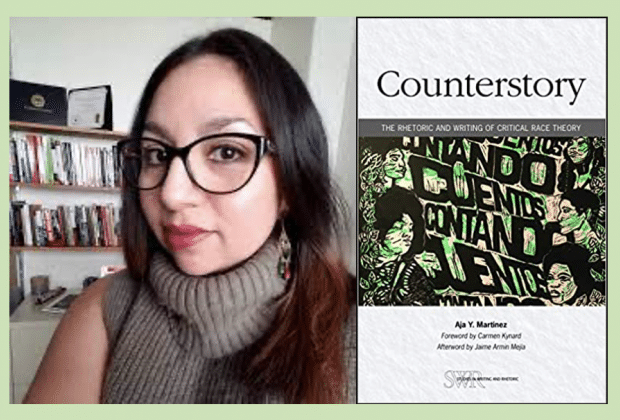On Monday, WRD hosted Dr. Aja Y. Martinez from The University of North Texas as part of its Writing and Rhetoric Across Borders Speaker Series. Her talk, titled “Story is Method,” was attended by a mixed in-person and online audience.
Dr. Martinez is well known for her work surrounding a modern research method that draws on Critical Race Theory and its seven tenants. The research method is counterstory, and WRD MA students who took Dr. Monica Reyes’ Multicultural Rhetorics course last Winter Quarter encountered and engaged Dr. Martinez’s work when they wrote their own counterstories.
Dr. Martinez spent substantial time and energy addressing the audience about what makes counterstory a legitimate and powerful research method in the humanities. In her words, counterstory is about “centering narratives of those whose stories are often silenced.” For example, when academics come together to assemble narratives of meaningful cultural circumstances, marginalized peoples are not often offered a seat at the table. As the talk progressed, Martinez argued that because marginalized people are not the majority, and thus their experiences, their stories, are not that of the majority, their stories are considered less relevant. Counterstory bridges this gap in representation and contributes to a more robust sample of experiences. Counterstories focus on the experiences of non-majority, thereby offering marginalized people a “seat at the table.” Martinez stated that these counterstories should be met with “hyper-credibility” in that their stories represent the experiences of non-dominant groups whose experiences, while lived, are not shared and not considered in humanities research.
While putting extra emphasis on Counterstory as Method, Martinez explained that the way scholars do research for counterstory makes the method so robust. She explained, “We look at data, and try to tie the data to dominant and non-dominant narratives at play.” She gave an example from her personal life, where data showed a small percentage of LatinX students earn a PhD compared to their white counterparts. She asked herself: what are the stories here? What is the pervasive narrative that explains this data, and what is the story behind the outlier data points? It is in this data-driven process that a careful method for telling those “outlier” stories is born. Those stories, when met with credibility and acceptance, go on to influence sociological theories and efforts towards social change.
Dr. Martinez closed her talk with an allegorical counterstory. The story was about birds who chose one another as family and sang a beautiful song. Other birds in the story began to notice the beautiful song but, when attempting to mimic the song, could not get it quite right. Martinez added that maybe if the other birds had been invited to sing with the family they would be successful. Martinez consistently centered her talk around the context of her audience at DePaul, and the story seemed like an allegory for power dynamics in academia, where marginalized stories are subject to appropriation by white majorities. Finally, Martinez encouraged audience members to acknowledge when their authentic experiences and stories are being undermined by white male or otherwise majoritarian academics. She proudly asked the audience to “call their shit out” if they feel like a societal and/or professional position is being leveraged against their experience, whether on purpose or not. This expression of solidarity with marginalized scholars felt especially compelling coming from a successful LatinX scholar who continues to be a living counterstory.
Monday’s talk closed with a feeling of understanding, empathy, and motivation to center non-dominant stories. Most of all, it left a feeling of resistance, persistence, and knowledge that stories from non-dominant scholars in academia are a powerful method for negotiating social change, and should be fought for and protected.
